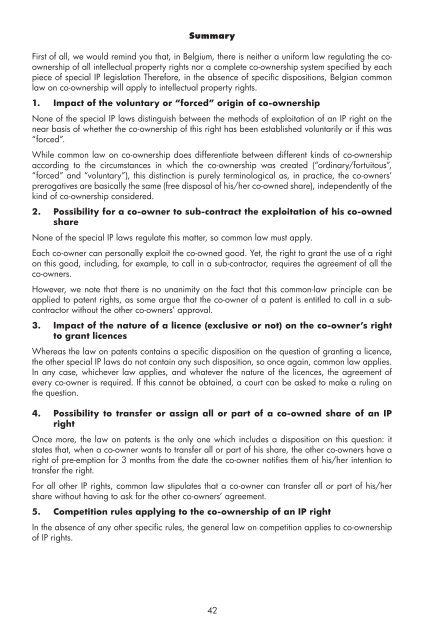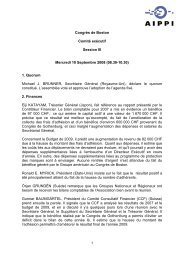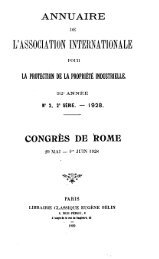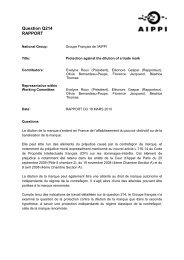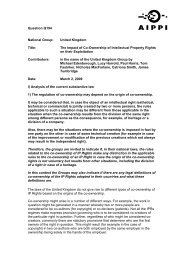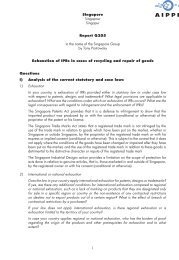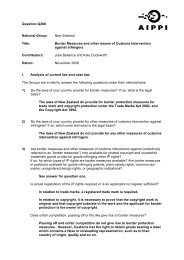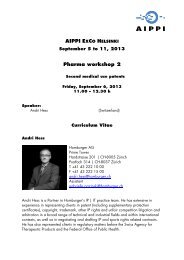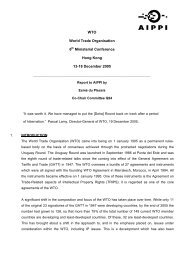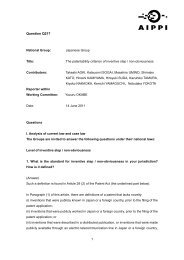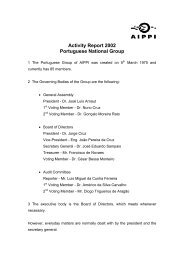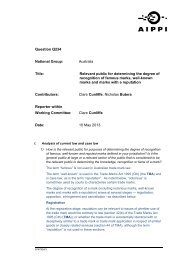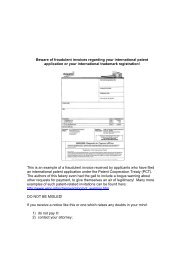- Page 1 and 2: ASSOCIATION INTERNATIONALE POUR LA
- Page 3 and 4: MEETING OF THE EXECUTIVE COMMITTEE
- Page 5 and 6: I. THE QUESTIONS ON THE AGENDA LES
- Page 7 and 8: The Questions on the Agenda On the
- Page 9 and 10: I. QUESTION Q194 The Impact of Co-o
- Page 11 and 12: Working Guidelines by Jochen E. Bü
- Page 13 and 14: In fact, the discussion showed that
- Page 15 and 16: Il peut être considéré que, dans
- Page 17 and 18: II) Proposition pour une future har
- Page 19 and 20: Diskussion und Fragen I) Analyse de
- Page 21 and 22: 6) Die Gruppen sind gebeten, noch e
- Page 23 and 24: Therefore, the groups are invited t
- Page 25 and 26: Résumé En Argentine, il existe de
- Page 27 and 28: According to Article 825 of the Gen
- Page 29 and 30: 3) In case of doubt the right to al
- Page 31 and 32: Belgium Belgique Belgien Report Q19
- Page 33 and 34: Il faut cependant souligner la rés
- Page 35 and 36: . Droit des marques La CBPI ne cont
- Page 37 and 38: c. Droit des dessins et modèles Un
- Page 39 and 40: 5) Droit de la concurrence - risque
- Page 41: Le Règlement Rome I prévoit princ
- Page 45 and 46: Brazil Brésil Brasilien Report Q19
- Page 47 and 48: encompass the establishment, or the
- Page 49 and 50: 6) The groups are invited to invest
- Page 51 and 52: Canada Canada Kanada Report Q194 in
- Page 53 and 54: 4) Is It Possible to Transfer or As
- Page 55 and 56: Summary Canadian law on the rights
- Page 57 and 58: Therefore, the groups are invited t
- Page 59 and 60: 3) All co-owners by themselves shou
- Page 61 and 62: if the right to exploit the patent
- Page 63 and 64: The Czech Group is of the opinion t
- Page 65 and 66: may continue such exploitation. The
- Page 67 and 68: The groups are therefore invited to
- Page 69 and 70: Miteigentum betreffen, die inter pa
- Page 71 and 72: (2) With reference to Intellectual
- Page 73 and 74: Egypt Egypte Ägypten Report Q194 i
- Page 75 and 76: The co-owned IP Rights may give the
- Page 77 and 78: Estonia Estonie Estland Report Q194
- Page 79 and 80: Co-ownership of trademarks, patents
- Page 81 and 82: Finland Finlande Finnland Report Q1
- Page 83 and 84: or his or her share of it, permissi
- Page 85 and 86: pursuant to section (i) or (ii) abo
- Page 87 and 88: France France Frankreich Report Q19
- Page 89 and 90: 1.2 “Successor” co-owners IP ri
- Page 91 and 92: Regarding “technical” creations
- Page 93 and 94:
In particular, one could imagine th
- Page 95 and 96:
The European Commission analysed th
- Page 97 and 98:
Because the Competition Council (Co
- Page 99 and 100:
Also, in the hypothesis where the c
- Page 101 and 102:
This question is strictly bound to
- Page 103 and 104:
(ii) In presence of a contract A ne
- Page 105 and 106:
2 On the subcontracting The co-owne
- Page 107 and 108:
13 Determination of the applicable
- Page 109 and 110:
7 Autres problèmes 7.1 Quel est le
- Page 111 and 112:
14 Andere Probleme 14.1 Was ist das
- Page 113 and 114:
The rules of inheritance law, which
- Page 115 and 116:
discussed whether such a right, der
- Page 117 and 118:
5) The exercise of an IP right co-o
- Page 119 and 120:
In absence of explicit provisions r
- Page 121 and 122:
It seems problematic, however, whet
- Page 123 and 124:
The situation that a party which su
- Page 125 and 126:
Germany Allemagne Deutschland Repor
- Page 127 and 128:
Wenn es dort in Ziffer 4a) heißt,
- Page 129 and 130:
Insgesamt erscheint uns hier der Ke
- Page 131 and 132:
Zusammenfassend kann daher zu dem K
- Page 133 and 134:
Gesamthandgemeinschaft das Statut d
- Page 135 and 136:
der Schutzrechts¬verletzung handel
- Page 137 and 138:
allerdings keine vergleichbare Rege
- Page 139 and 140:
Résumé Les parts de copropriété
- Page 141 and 142:
The effect is that any dealing is s
- Page 143 and 144:
Hungary Hongrie Ungarn Report Q194
- Page 145 and 146:
een obtained if the Working Committ
- Page 147 and 148:
If this is the case, what in the op
- Page 149 and 150:
Indonesia Indonésie Indonesien Rep
- Page 151 and 152:
No differentiation was also made on
- Page 153 and 154:
The groups are therefore invited to
- Page 155 and 156:
Israel Israël Israel Report Q194 i
- Page 157 and 158:
In light of the above, the question
- Page 159 and 160:
The Restrictive Trade Practices Law
- Page 161 and 162:
4) Copyright, Patents and Trademark
- Page 163 and 164:
if the right to exploit the patent
- Page 165 and 166:
The groups are therefore invited to
- Page 167 and 168:
assignment, whether in whole or in
- Page 169 and 170:
Malaysia Malaisie Malaysia Report Q
- Page 171 and 172:
Co-ownership and Exploitation of In
- Page 173 and 174:
Mexico Mexique Mexiko Report Q194 i
- Page 175 and 176:
Mexican legislation establishes dif
- Page 177 and 178:
Résumé La copropriété des droit
- Page 179 and 180:
2) No common position could be achi
- Page 181 and 182:
As explained above, a share in a co
- Page 183 and 184:
3. Thirdly, the question arises whi
- Page 185 and 186:
New Zealand Nouvelle-Zélande Neuse
- Page 187 and 188:
elation to the patent, including th
- Page 189 and 190:
Summary Copyright Copyright has two
- Page 191 and 192:
This question, particularly importa
- Page 193 and 194:
6) The groups are invited to invest
- Page 195 and 196:
Cependent la loi norvégienne refl
- Page 197 and 198:
2) A large debate, during the Singa
- Page 199 and 200:
The groups are therefore invited to
- Page 201 and 202:
Paraguay Paraguay Paraguay Report Q
- Page 203 and 204:
The co-owned IP Rights may give the
- Page 205 and 206:
2) A large debate, during the Singa
- Page 207 and 208:
Our legislation clearly establishes
- Page 209 and 210:
joint favor or by reason of the ass
- Page 211 and 212:
owned IP right, although said law p
- Page 213 and 214:
Portugal Portugal Portuga Report Q1
- Page 215 and 216:
As for author’s rights, the licen
- Page 217 and 218:
As regards Council Regulation ROME
- Page 219 and 220:
More specifically, the groups were
- Page 221 and 222:
II) Proposal for the future harmoni
- Page 223 and 224:
Therefore, the groups are invited t
- Page 225 and 226:
And more specifically the Groups ar
- Page 227 and 228:
En vertu de l’art. 5 (3) de la Lo
- Page 229 and 230:
of subcontracting when a co-owner o
- Page 231 and 232:
II) Proposal for the future harmoni
- Page 233 and 234:
3) This question relates to the pos
- Page 235 and 236:
Spain Espagne Spanien Report Q194 i
- Page 237 and 238:
Therefore, in order to improve the
- Page 239 and 240:
The Groups of the EU Countries are
- Page 241 and 242:
Résumé La réglementation de la c
- Page 243 and 244:
Sweden Suède Schweden Report Q194
- Page 245 and 246:
Therefore, in order to improve the
- Page 247 and 248:
co-owners, the co-owners are free t
- Page 249 and 250:
The Swedish Group believes that har
- Page 251 and 252:
Switzerland Suisse Schweiz Report Q
- Page 253 and 254:
if the right to exploit the patent
- Page 255 and 256:
The relationship between the origin
- Page 257 and 258:
Résumé Pour ce qui est du droit s
- Page 259 and 260:
Thailand Thaïlande Thailand Report
- Page 261 and 262:
For the conditions of granting a li
- Page 263 and 264:
7) Finally, the groups are also inv
- Page 265 and 266:
Ownership in common is a type of ow
- Page 267 and 268:
his heirs. Hence, the right to expl
- Page 269 and 270:
shall announce by an application to
- Page 271 and 272:
commune où chaque propriétaire a
- Page 273 and 274:
accordance with his testimonial wis
- Page 275 and 276:
3) The working guidelines establish
- Page 277 and 278:
this approach. The R&DE exempting f
- Page 279 and 280:
In the absence of party choice, Art
- Page 281 and 282:
Le groupe supporte les changements
- Page 283 and 284:
In addition to the above, in situat
- Page 285 and 286:
Examples of specific rights that ar
- Page 287 and 288:
C. Copyrights Rights are freely tra
- Page 289 and 290:
And more specifically the Groups ar
- Page 291 and 292:
Summary Patents: Under United State
- Page 293 and 294:
Summary Report Question Q194 The im
- Page 295 and 296:
- It should also be noted that in t
- Page 297 and 298:
Thus, it appears that on this issue
- Page 299 and 300:
7. It is also important to note tha
- Page 301 and 302:
Dans ce contexte, il faut égalemen
- Page 303 and 304:
intellectuelle et, plus particuliè
- Page 305 and 306:
La position la plus forte à ce suj
- Page 307 and 308:
Et la Commission pourrait proposer
- Page 309 and 310:
Auf diese Weise ist jeder, der eine
- Page 311 and 312:
In diesem Zusammenhang entstand ein
- Page 313 and 314:
Dies ist in Frankreich, Ungarn, Mex
- Page 315 and 316:
8. Schließlich ist anzumerken, das
- Page 317 and 318:
2) The Singapore resolution held th
- Page 319 and 320:
Résolution Question Q194BA L’inf
- Page 321 and 322:
a) le copropriétaire dirige et sup
- Page 323 and 324:
In Anbetracht der Tatsache, dass: 1
- Page 325 and 326:
Im Hinblick auf die Bedeutung und K
- Page 327 and 328:
I. QUESTION Q209 Selection Inventio
- Page 329 and 330:
Working Guidelines by Jochen E. Bü
- Page 331 and 332:
associated with the inventive level
- Page 333 and 334:
5) Infringement If a certain advant
- Page 335 and 336:
Orientations de travail De Jochen E
- Page 337 and 338:
11) En ce qui concerne les brevets
- Page 339 and 340:
4) la portée d’une revendication
- Page 341 and 342:
Arbeitsrichtlinien* von Jochen E. B
- Page 343 and 344:
Nicht-Offensichtlichkeit oder Erfin
- Page 345 and 346:
können sie nach der ursprüngliche
- Page 347 and 348:
Argentina Argentine Argentinien Rep
- Page 349 and 350:
3) the time frame within which suff
- Page 351 and 352:
Knowledge of the advantageous prope
- Page 353 and 354:
Australia Australie Australien Repo
- Page 355 and 356:
(a) Optical fibre cable This decisi
- Page 357 and 358:
The question of ‘selection’ ari
- Page 359 and 360:
In the case of a selection patent,
- Page 361 and 362:
For the reasons outlined above, mer
- Page 363 and 364:
i.e. would the analysis be differen
- Page 365 and 366:
Austria Autriche Österreich Report
- Page 367 and 368:
in (partial) nullity of the patent
- Page 369 and 370:
The necessity for a selection inven
- Page 371 and 372:
limited product claim in the form o
- Page 373 and 374:
1) the threshold for sufficiency; T
- Page 375 and 376:
circumstances there could be indire
- Page 377 and 378:
Harmonisation 12) Groups are asked
- Page 379 and 380:
2) Novelty Groups are asked to disc
- Page 381 and 382:
With Reference to the Examples 7) N
- Page 383 and 384:
Since BR IP Law 9279/96 is silent c
- Page 385 and 386:
Also, the Manual of Patent Office P
- Page 387 and 388:
Based on the decision of the Suprem
- Page 389 and 390:
e able to obtain protection for the
- Page 391 and 392:
[70] Another important factor may a
- Page 393 and 394:
Chile Chili Chile Report Q209 in th
- Page 395 and 396:
have previously an equivalent solut
- Page 397 and 398:
grant of selection patents and the
- Page 399 and 400:
The selection inventions may be sor
- Page 401 and 402:
(2) Where the numerical values or n
- Page 403 and 404:
The following are examples of the c
- Page 405 and 406:
Therefore, a certain advantage or s
- Page 407 and 408:
out the technical solution of the i
- Page 409 and 410:
Czech Republic République Tchèque
- Page 411 and 412:
possible compounds (very few of whi
- Page 413 and 414:
Zusammenfassung Die tschechische La
- Page 415 and 416:
the teaching of a prior art documen
- Page 417 and 418:
please see above under sub-question
- Page 419 and 420:
11) Policy Groups are asked to cons
- Page 421 and 422:
Ecuador Equateur Ecuador Report Q20
- Page 423 and 424:
Also, with respect to item 4) above
- Page 425 and 426:
grant of selection patents and the
- Page 427 and 428:
4) Sufficiency and/or written descr
- Page 429 and 430:
illustrative material will be used
- Page 431 and 432:
Finland Finlande Finnland Report Q2
- Page 433 and 434:
With respect to item 1), please dis
- Page 435 and 436:
11) Policy Groups are asked to cons
- Page 437 and 438:
France France Frankreich Question Q
- Page 439 and 440:
Des proportions sont privées de no
- Page 441 and 442:
L’activité inventive peut aussi
- Page 443 and 444:
Selon l’appréciation de la nouve
- Page 445 and 446:
14) Groups are asked to outline any
- Page 447 and 448:
Germany Allemagne Deutschland Repor
- Page 449 and 450:
3) Inventive step or non-obviousnes
- Page 451 and 452:
There are no specific requirements
- Page 453 and 454:
Sufficiency of disclosure within th
- Page 455 and 456:
Résumé La loi allemande ne conna
- Page 457 and 458:
Nach unserem Verständnis der aktue
- Page 459 and 460:
4) Anforderungen an vollständige O
- Page 461 and 462:
7) Neuheit Würde in Beispiel 1 im
- Page 463 and 464:
Nach deutscher Rechtslage liegt bei
- Page 465 and 466:
Hungary Hongrie Ungarn Report Q209
- Page 467 and 468:
1) the threshold for sufficiency Al
- Page 469 and 470:
property), or should any patent pro
- Page 471 and 472:
Indonesia Indonésie Indonesien Rep
- Page 473 and 474:
scope of invention as originally fi
- Page 475 and 476:
In the analysis, does it matter how
- Page 477 and 478:
Italy Italie Italien Report Q209 in
- Page 479 and 480:
5) Infringement If a certain advant
- Page 481 and 482:
irrelevant in an age of combinatori
- Page 483 and 484:
alternative or combination (herein
- Page 485 and 486:
would it be necessary to recite suc
- Page 487 and 488:
Even if a competitor has manufactur
- Page 489 and 490:
Mexico Mexique Mexiko Report Q209 i
- Page 491 and 492:
3) the time frame within which suff
- Page 493 and 494:
Netherlands Pays-Bas Niederlande Re
- Page 495 and 496:
4) Sufficiency and/or written descr
- Page 497 and 498:
a species with e.g. a surprisingly
- Page 499 and 500:
irrelevant in an age of combinatori
- Page 501 and 502:
in the mechanical and electrical fi
- Page 503 and 504:
4) Sufficiency and/or written descr
- Page 505 and 506:
untested in New Zealand. In that an
- Page 507 and 508:
irrelevant in an age of combinatori
- Page 509 and 510:
Norway acceded to the EPC effective
- Page 511 and 512:
8) Inventive step or non-obviousnes
- Page 513 and 514:
Zusammenfassung Es gibt im norwegis
- Page 515 and 516:
in case of a broad range (temperatu
- Page 517 and 518:
7) Novelty In example 1 would the p
- Page 519 and 520:
• The selection consists of a ran
- Page 521 and 522:
Paraguay Paraguay Paraguay Report Q
- Page 523 and 524:
7) Novelty In example 1 would the p
- Page 525 and 526:
Peru Pérou Peru Report Q209 in the
- Page 527 and 528:
6) Is there any special rule to exa
- Page 529 and 530:
2) Novelty Groups are asked to disc
- Page 531 and 532:
No, possibilities (i), (ii) and (ii
- Page 533 and 534:
In general, other improvements are
- Page 535 and 536:
10) Infringement By reference to ex
- Page 537 and 538:
Republic of Korea République du Co
- Page 539 and 540:
If a selection invention is claimed
- Page 541 and 542:
other hand, such technical developm
- Page 543 and 544:
The claimed invention is new, if it
- Page 545 and 546:
5) Infringement If a certain advant
- Page 547 and 548:
11) Policy Groups are asked to cons
- Page 549 and 550:
Résumé En Roumanie sont reconnues
- Page 551 and 552:
Russia Russie Russland Report Q209
- Page 553 and 554:
Pursuant to the existing practice i
- Page 555 and 556:
10) Infringement By reference to ex
- Page 557 and 558:
2) Novelty Groups are asked to disc
- Page 559 and 560:
if experimental data is to form par
- Page 561 and 562:
As selection inventions are not tre
- Page 563 and 564:
13) Groups are also asked to recomm
- Page 565 and 566:
2) Novelty Groups are asked to disc
- Page 567 and 568:
advantageous. All that is required
- Page 569 and 570:
In all likelihood, only the third i
- Page 571 and 572:
the same advantage with an unpredic
- Page 573 and 574:
or offering it for use when the thi
- Page 575 and 576:
art? Inventive step is only possibl
- Page 577 and 578:
14) Groups are asked to outline any
- Page 579 and 580:
Sweden Suède Schweden Report Q209
- Page 581 and 582:
Prerequisite: In order for such lat
- Page 583 and 584:
“selection inventions”. The gen
- Page 585 and 586:
irrelevant. However it may be an ar
- Page 587 and 588:
Switzerland Suisse Schweiz Report Q
- Page 589 and 590:
4) Sufficiency and/or written descr
- Page 591 and 592:
state of the art. Furthermore heavy
- Page 593 and 594:
invention. However, such limiting v
- Page 595 and 596:
La condition de suffisance d’expo
- Page 597 and 598:
Turkey Turquie Türkei Report Q209
- Page 599 and 600:
even an implicit referral to said a
- Page 601 and 602:
ewarded for his efforts and obtain
- Page 603 and 604:
United Kingdom Royaume-Uni Vereinig
- Page 605 and 606:
2) Novelty Groups are asked to disc
- Page 607 and 608:
1) the threshold for sufficiency; 2
- Page 609 and 610:
6) Policy Groups are asked to give
- Page 611 and 612:
As explained in response to questio
- Page 613 and 614:
There is no disclosure of whether o
- Page 615 and 616:
numerous) so long as their formulae
- Page 617 and 618:
that the lower court “conclude[d]
- Page 619 and 620:
On the other hand, if the genus cla
- Page 621 and 622:
and if the species compound is clai
- Page 623 and 624:
the claimed invention in the absenc
- Page 625 and 626:
willful infringement, a patentee mu
- Page 627 and 628:
disclosed in the prior art would no
- Page 629 and 630:
a selection invention in a “predi
- Page 631 and 632:
The individual Group reports largel
- Page 633 and 634:
Inventive step or non-obviousness T
- Page 635 and 636:
Infringement The Groups were asked
- Page 637 and 638:
• On novelty, should there be spe
- Page 639 and 640:
Les rapports nationaux ont, de mani
- Page 641 and 642:
Comme précédemment indiqué, dans
- Page 643 and 644:
Singapour, en Nouvelle Zélande en
- Page 645 and 646:
Certains groupes sont d’avis que
- Page 647 and 648:
Zusammenfassender Bericht Frage Q20
- Page 649 and 650:
Hinsichtlich der technischen Anwend
- Page 651 and 652:
in Japan, Korea, auf den Philippine
- Page 653 and 654:
und zum anderen wo die Ansprüche d
- Page 655 and 656:
• Ist es, angesichts des Erforder
- Page 657 and 658:
Resolves that: 1) It should be poss
- Page 659 and 660:
Adopte la résolution suivante: 1)
- Page 661 and 662:
Verabschiedet die folgende Entschli
- Page 663 and 664:
Table of contents Meeting of the Ex
- Page 665 and 666:
III. Q209: Selection Inventions - t
- Page 667 and 668:
Table des matières Réunion du Com
- Page 669 and 670:
III. Q209: Les Inventions de sélec
- Page 671 and 672:
Inhaltsverzeichnis Zusammenkunft de
- Page 673 and 674:
III. Q209: Auswahlerfindungen - das


